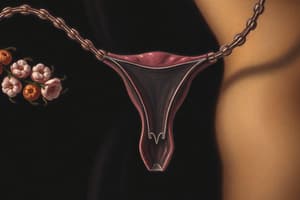Podcast
Questions and Answers
What is one of estrogen's primary roles during the menstrual cycle?
What is one of estrogen's primary roles during the menstrual cycle?
- Reducing vaginal secretions
- Inhibiting brain function
- Thickening the endometrial lining (correct)
- Decreasing bone density
How does estrogen impact bone health?
How does estrogen impact bone health?
- Decreases bone density and strength
- Protects against osteoporosis (correct)
- Has no effect on bones
- Causes bone pain
What symptoms can occur due to a decline in estrogen levels during menopause?
What symptoms can occur due to a decline in estrogen levels during menopause?
- Reduced blood vessel function
- Improved cognitive function
- Increased vaginal secretions
- Hot flashes and night sweats (correct)
What condition can result from estrogen imbalances during the menstrual cycle?
What condition can result from estrogen imbalances during the menstrual cycle?
What can high levels of androgens lead to in relation to estrogen?
What can high levels of androgens lead to in relation to estrogen?
Study Notes
Menstrual Hormones: Uncovering Estrogen's Role
Estrogen, a vital hormone produced by women's bodies, plays a pivotal role in the menstrual cycle. This hormone, along with others like progesterone, governs the delicate dance of tissues and fluids that lead to menstruation. To understand menstrual hormones, let's delve into estrogen's critical functions and its impact on the monthly cycle.
The Estrogen Family
Estrogen comes in three primary forms: estrone (E1), estradiol (E2), and estriol (E3). Estradiol is the most potent and abundant naturally occurring estrogen in women's bodies. It's primarily synthesized in the ovaries, but other tissues like adipose and brain cells also produce smaller amounts.
Estrogen's Role in the Menstrual Cycle
The menstrual cycle is divided into three primary phases: the follicular phase, ovulation, and the luteal phase. Estrogen levels fluctuate throughout these phases:
-
Follicular Phase: Follicle-stimulating hormone (FSH) levels rise, stimulating the growth and maturation of a single ovarian follicle. Estrogen levels begin to increase as the follicle develops.
-
Ovulation: Once the follicle matures, it releases an egg, and estrogen levels peak. This surge in estrogen triggers a surge in luteinizing hormone (LH), which causes ovulation.
-
Luteal Phase: The remaining follicle develops into the corpus luteum, which produces progesterone and continues to secrete estrogen. This maintains the uterine lining in preparation for a potential pregnancy.
Estrogen's Effects on the Uterus and Vagina
Estrogen's primary roles during the menstrual cycle include:
- Thickening the endometrial lining: Estrogen stimulates the growth of the uterine lining (endometrium) to prepare for a potential pregnancy.
- Increasing vaginal secretions: Estrogen enhances the production of vaginal mucus, making it more elastic and lubricated to facilitate sperm movement.
Estrogen's Impact on other Body Systems
Estrogen also impacts other body systems:
- Bones: Estrogen helps maintain bone density and strength, protecting against osteoporosis.
- Brain: Estrogen influences mood, memory, and cognitive function.
- Cardiovascular system: Estrogen improves blood vessel function and can protect against heart disease.
Estrogen's Impact on Menopause
As women approach menopause, their ovaries produce less estrogen, leading to a decline in estrogen levels. This decline can cause symptoms such as hot flashes, night sweats, and vaginal dryness. Hormone replacement therapy (HRT) can help alleviate these symptoms by providing synthetic estrogen.
Imbalances and Disorders
Estrogen imbalances can lead to various conditions:
- Premenstrual syndrome (PMS): Anxiety, mood swings, and other symptoms can result from estrogen fluctuations during the menstrual cycle.
- Polycystic ovary syndrome (PCOS): High levels of androgens (male hormones) can lead to irregular menstrual cycles, excess estrogen, and other symptoms.
- Estrogen dominance: When estrogen levels are disproportionately high relative to progesterone, it can cause a variety of symptoms, including irregular periods, mood swings, and fatigue.
In conclusion, estrogen is a critical hormone in women's bodies, exerting far-reaching effects on the menstrual cycle and various other body systems. Its fluctuations throughout the menstrual cycle are vital in regulating the uterine lining and preparing for potential pregnancy. Understanding estrogen's role can help women better understand their bodies and the complex dance of hormones that govern their menstrual cycle.
References:
- Brown, M. (2021). Menstrual Cycle and Hormones. In StatPearls [Internet]. Treasure Island, FL: StatPearls Publishing. Available from: https://www.ncbi.nlm.nih.gov/books/NBK544854/
- American College of Obstetricians and Gynecologists. (2020). Your Menstrual Cycle. Available from: https://www.acog.org/womens-health/faqs/your-menstrual-cycle
Studying That Suits You
Use AI to generate personalized quizzes and flashcards to suit your learning preferences.
Description
Delve into the pivotal role of estrogen in the menstrual cycle, its functions, impact on the uterus, vagina, and other body systems. Explore estrogen's effects on the menstrual phases, menopause, and imbalances like estrogen dominance and PCOS.




